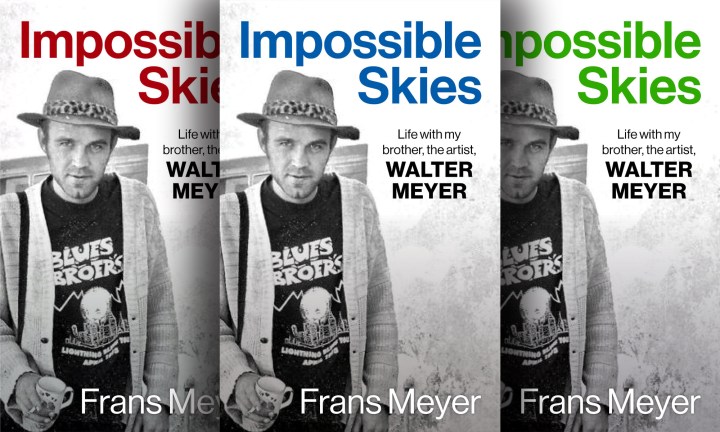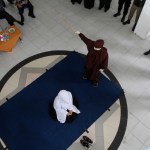BOOK REVIEW
‘Impossible Skies’ — a documentation of an unequivocal genius of South African art

The memoir of Walter Meyer, dubbed South Africa’s Van Gogh, written by Walter’s brother Frans, and called ‘Impossible Skies’ after the vibrancy Walter managed to capture in the skies of his paintings, was published earlier this year.
The memoir is a powerful read, as well as an impossibly sad one.
The last section of the book had me in tears, not just for the sad downfall of one of this country’s most accomplished artists, but also for the resonances Walter’s ending had for me and will have for many who know people like him. Walter Meyer was an inspired artist, intrinsically creative and a quiet genius. This much is without question. He was also an alcoholic and his inability to stop drinking was the cause of his inevitably tragic end.
It isn’t revelatory to state that bereavement is a terrible thing for anyone to endure. To lose a family member is especially difficult. To lose a sibling, one who has been with you from your earliest memories, and one whom you looked up to, or even idolised, is soul-destroying. Frans was the most loving and supportive brother to Walter, the oldest of the four Meyer children. Walter grew up in a well-off Christian home with a professional father of German origin who’d made his mark in the world of engineering, and a mother of Dutch origin with artistic tendencies who had put aside her own hopes of a career to be a mother and wife. Both the parents and Walter’s siblings supported his artistic passion without question.
Walter was a sensitive boy, an introvert who preferred being with nature to being with people. He was quite different from Frans, but neither minded the other’s differences. When Frans undertook his conscripted military service without question, Walter went to Germany to study at the Kunstakademie Dusseldorf, leaving his art degree at Tuks in his second year. His family were distressed by this decision as one didn’t drop out of a degree in their world, and one didn’t forgo one’s duty to one’s country.
“Years later, as grown men on the farm in the Karoo, we would discuss our earlier misgivings about our lives’ paths. I shared some of the experiences I’d endured during the war and a few unpleasant memories. All those years later, both of us much older and hopefully wiser, it was as if the divisions between my brother and me had never existed.”
Frans details their family background from his great-grandparents on both sides and traces Walter’s artistic roots to their maternal grandmother.
From his earliest childhood, Walter’s eyes were trained on the distant horizon. He wasn’t interested in material things and was certain that art was his destiny. Frans remembers being a bit envious of his brother’s certainty about his life’s vocation from his youth, something Frans didn’t necessarily share.
After his time in Germany, Walter returned to South Africa in 1990. He’d longed for the open veldt and the vistas of unspoiled countryside but unfortunately, he was drafted by the SADF. Within two weeks, he “escaped” to South West Africa. Walter’s father was influential enough to “smooth over” Walter’s AWOL, and the army decided they were better off without him. After a few false starts, Walter went to join an artist’s colony in Paarl, with the help of his ever-supportive father, although it didn’t work out. But he’d met the love of his life while in Windhoek, in 1991.
Catharina Scheepers is an artist in her own right who works with communities to uplift them. The two were a great match and were finally married in 1992. Unfortunately, Walter’s drinking didn’t stop, no matter how many times Catharina and Walter’s parents put Walter into rehab; after trying for a quiet life in Upington for a few years, they were divorced and Walter’s life descended into a self-destructive spiral. Frans talks of the “dark premonition that his brother’s life would come to a tragic end”.
The tragic end Frans and his family feared was provided by Sophia, a 20-year-old woman who was already pregnant with his child when they married in 2010.
Sophia drank as much, if not more than Walter, and didn’t seem to care about her children; her first child was taken away by Walter’s mother when the child was two. More children followed but the drinking never abated. Walter did everything he could to keep Sophia happy, even selling his house in Upington with its beloved roses to buy Sophia a house near her friends. She and her friends destroyed Walter’s Hilux with bricks in a drunken brawl, and he often phoned Frans late at night, fearing for his life.
In the end, Walter lodged in a nearby room in a small town called Dagbreek. With his car in for repairs, Walter walked to see his children and Sophia. He’d phoned Catharina before he left who promised to help him the following day. No one would be able to help him as Sophia stabbed to death Walter Meyer in the chest with a kitchen knife that evening.
The self-destructive tendency and inability to fit in with so-called normal society is heartbreaking, even though these qualities often accompany creativity and genius.
Walter Meyer was one of South Africa’s most unapologetic artists.
He painted the countryside in its bleakness, in its unadorned loneliness. Although his work is almost photo-realist, it goes beyond this genre in its honesty. To me, Meyer’s paintings recreate the feelings I had when growing up in small towns in the Free State, where the overwhelming sense was that hope had been abandoned. It was only when looking up that I would feel that there was a possible escape from the inevitability of mediocrity. It was in the Free State’s “impossible skies” that the future would seem limitless. That is exactly what Meyer’s work captured.
Frans Meyer’s memoir is a loving account of a brother, a son, a husband and a father. It is more than that too, as it is a documentation of an unequivocal genius of South African art, whose work deserves to be celebrated. DM




















 Become an Insider
Become an Insider
Oh my, oh my, such deep sadness! Always loved the work, but knew nothing of the artist until now.
@David Bristow – a very sad story. There are certain creative people who can’t quite adapt to so-called normal society. Heart-breaking. Janet van Eeden.